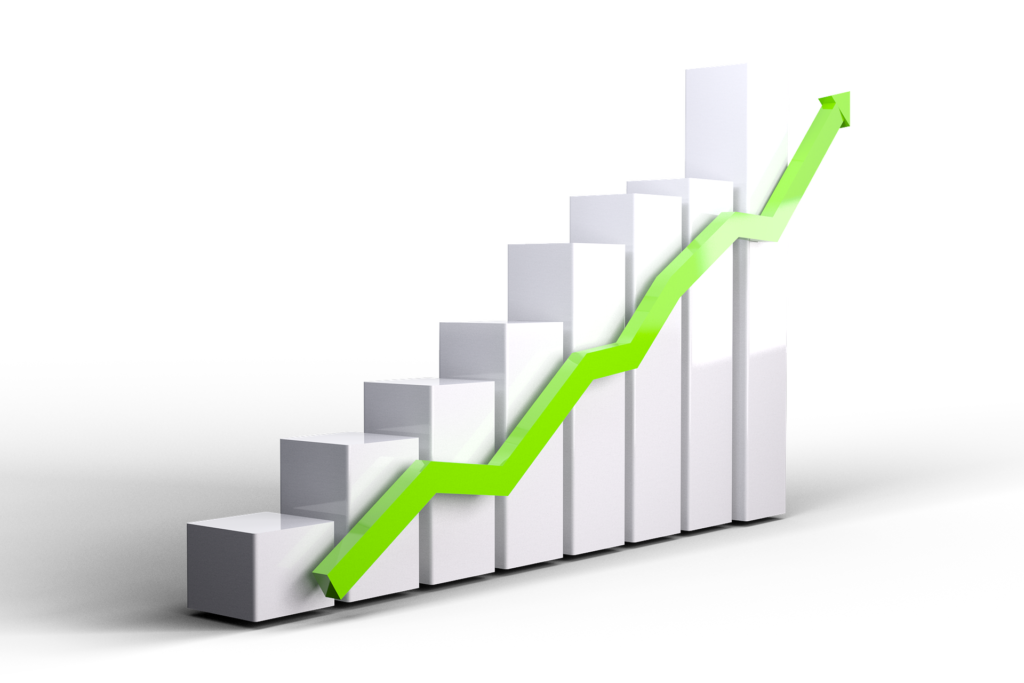At A Glance – Learn how to start investing and growing your money. Investing in the stock market is easier than you think.
What Is Investing?
Investing is when you purchase assets that you expect to earn a profit in the future. These assets could be anything you believe will rise in value, such as a home or collectible. Although investing commonly refers to buying stocks and bonds.
The goal of investing is to put your money to work today so it will grow your money over time.
What Is The Stock Market?
First, let’s define a stock. A stock is a type of asset that represents fractional ownership in a company. When you buy stock in a company, you own a piece of that business. If you own a share of Amazon, you are a part-owner of Amazon!
Publicly traded companies are companies that issue stock that can be purchased by individuals or organizations. The stock market is made up of all publicly traded companies.
A stock market or stock exchange is a place where people buy and sell stocks. There are several of these in the U.S., but the two best known are the New York Stock Exchange (NYSE) and the Nasdaq.
There are “indexes” that give you a feel of how the overall market is doing. These indexes are a basket of stocks that are averaged to indicate overall performance. The most popular indexes are the Dow Jones Industrial Average, The Nasdaq Composite, and the S&P 500. The Dow Jones tracks 30 large, significant U. S. stocks. The S&P 500 is a much broader base of 500 large companies. The Nasdaq is more oriented towards tech companies.
Why Invest In The Stock Market?
What we all hope to gain with our investing is more money over time. Since our investing plan should always be long-term, our money will be invested for decades.
Because of our long investing time horizon, we must consider inflation. Inflation is like a termite that eats away at your wealth. If you bought $100 worth of groceries 10 years ago (2011), they would cost you approximately $120-130 today. You can see that taking your hard-earned savings and putting it in the mattress is not a good plan! Also, the current (2021) interest rates on savings accounts or money market accounts will not keep up with inflation. So, savings accounts are not the place for money invested long term.
We need an investment that will do better with our dollars. The stock market is one of the best wealth-building tools we have available. But many new investors are afraid of the stock market. Is the stock market volatile? Yes. Is it still the best place to invest my money to grow my wealth? Again…Yes.
The stock market goes up and it goes down, but over time the market always goes up. There has been disaster after disaster that has caused the market to go down – sometimes significantly. But over time, the market always goes up. If you look back over its history, the market has averaged roughly between 8% and 10% per year. You can see this is significantly better than most other investing choices.
Let’s look at two examples of how your money can grow. The first chart shows three different investment amounts with no additional money added. We will use an average return of 8% per year for 30 years. Say, age 30 to age 60.
| Amount Invested | Market Gain | Total |
| $ 10,000 | $ 99,357 | $ 109,357 |
| $ 50,000 | $496,786 | $ 546,786 |
| $100,000 | $993,573 | $1,093,573 |
The next chart shows a more real-life example. We will start with $0 and add money every month from savings. Again, the money is growing at 8%.
| Amt Invested/mo. | Time Period | Amt Invested | Total |
| $ 100 | 30 years | $ 36,000 | $ 150,030 |
| $ 250 | 30 years | $ 90,000 | $ 375,074 |
| $1,000 | 30 years | $360,000 | $1,500,295 |
These examples assume that any interest or dividends your stock receives is reinvested and not withdrawn. This shows how compounding works for you over time. You can see from these examples the stock market is a much better way to grow your money.
Can I Lose My Money?
Returns in the stock market are not guaranteed like the interest rate on a savings account. There is risk associated with investing. So the short answer to the question “Can you lose money?” is yes – over the short term.
Can you lose money if you leave it in for the long haul? Unlikely. Don’t forget, your stock market investments are long term. This is a marathon, not a sprint. This is not get rich quick. History has shown if you save, invest and leave it alone, you will build wealth.
What Are Stocks, Bonds, Mutual Funds And ETFs?
Stocks – As stated above, a stock is fractional ownership in a company. Money is made with stocks in two main ways. One, the price of a stock can go up as the company does well. You make money if you sell the stock for more than you paid for it. Second, the company may pay dividends. This is how the company shares profits with its stockholders. Dividends are typically paid once a quarter. The dividends can be left in the investment account to buy more shares.
Bonds – When you buy a stock, you are buying part ownership in a company. When you buy bonds, you are loaning money to a company or government agency. A bond could be thought of like an IOU. Bonds are used by companies, municipalities, states, and governments to finance projects and operations. A bond issuer promises to pay the bond or loan back in a specified time at a specified interest rate. An example would be bonds issued by your local school district for a new building.
Mutual Funds – A mutual fund is a basket of stocks. Mutual fund managers decide what and how many stocks to buy. These funds come in all flavors. It can be, for example, a basket of all large companies, small up-and-coming companies, or all healthcare sector companies. There are thousands of mutual funds to choose from. The major advantage of a mutual fund is diversification. You don’t have to decide which individual stocks to buy, you just pick the flavor you want. The disadvantage is they can have high fees attached to them. There is a person managing the buying, selling and decision making and they aren’t cheap. Their fees will eat away at your profits, but the diversification that mutual funds bring to the table is a good thing.
ETFs – an ETF or Exchange Traded Fund is very similar to a mutual fund. Their main difference is the way they are bought and sold during the hours the stock market is open.
How Can I Invest In The Stock Market?
Choose An Investment Firm
So you’re ready to invest some of your savings. Now what?
You will need to open a brokerage account. To trade on the stock market, you will need an account at a brokerage or investment firm. There are many brokerage firms out there, but the ones I would recommend are Vanguard, Fidelity, and Charles Schwab. I personally use Vanguard. You can open an account online in a matter of minutes.
When you first open your account, you will be asked how you will initially fund this account. You can send money from your bank, rollover money from an employer retirement account like a 401k or transfer money from another brokerage firm.
After setting up your account, you can tie your brokerage account to your checking or savings account. This allows you to move money back and forth online. One huge advantage of this connection is making your savings and investing automatic. You can decide how much money is going to investing each month and have it sent there automatically. Your emotions and temptation to spend it just got removed!
Choose The Type Of Account
You can set up different types of accounts. The main types of accounts are a taxable brokerage account, a retirement account such as a Traditional IRA or ROTH IRA, or a 529 Educational account. IRAs and 529s are tax-advantaged accounts. A taxable brokerage account is a plain investment account with no special tax treatment. Stephen and I have a joint taxable account and we each have Traditional and ROTH IRAs.
Choose The Type Of Investment
Here is the big question! And I really can’t tell you what to do – partly because I’m not licensed to do that nor am I an expert. But, I can tell you what I do.
I like to KEEP IT SIMPLE. As J. L. Collins says, “Simple is good. Simple is easier. Simple is more profitable.”
I invest in low-cost index funds and bond funds. Index funds track a particular index, like the S&P 500. There are many advantages to index funds like high performance, low cost, and very low volatility.
The index fund I use is a Vanguard Total Stock Market Index Fund or VTSAX. It tracks the entire stock market. This means I own a small piece of every publicly traded company in the stock market. This is where the majority of my investments are – 70% currently. Index funds have extremely low costs because they are not actively managed. They just track the market. They are high-performing because those active managers cannot consistently “beat the market.” And their fees eat away at your returns.
The bond fund I invest in is the Vanguard Total Bond Market Index Fund or VBTLX. Just like VTSAX, the Total Bond Fund is a broad base of bonds. This fund includes investment grade (top quality) bonds with widely differing maturity dates and a broad range of terms.
Why hold stocks and bonds? Stocks provide the best returns over time and serve as a protection against inflation (inflation hedge). Bonds provide some income and serve as a deflation hedge. Also, bonds are less volatile than stocks. They smooth out the wild highs and lows that can be seen in the stock market. You won’t make as much money from bonds as you do stocks, but they make the roller coaster a little easier to ride.
TIP: I like to keep things simple and I have only given you the very basics when it comes to investment info. I would HIGHLY recommend you read J. L. Collins book, The Simple Path to Wealth, Your Road Map to Financial Independence and a Rich, Free Life. It helped us when we didn’t know what we were doing or where to turn. Jim explains the stock market, how it works, how to use it to grow your money, and how to not be afraid of it. Buy the book, check it out from your library or you can check out his Stock Series on his blog jlcollinsnh.com. Do it! His book helped us more than any other one thing we have done for our finances, short of getting our mindset changed.
How Much Should I Invest?
In my article, How To Save Money, I talk about your short, medium, and long-term needs. Everything you are putting in long-term savings should go into investments. This is the money you will want working for you for decades.
If you are starting late as I did, you need to be saving aggressively and investing wisely. The number of years before retirement may be short, but even in retirement, you could have a 20 or 30-year investing horizon.
When Should I Invest?
Now! Don’t wait for the market to drop or wait until you understand every nuance about the stock market. Formulate your simple plan and get started.
If you have a company match with your 401k, BE SURE you are getting the match. That’s free money! Also, look at the investing options in your employer’s plan. Do they offer low-cost index funds? You might check into making a change.
TIP: Your taxable brokerage account, 401k, IRA, HSA or 529 plan are just buckets to hold your money. Just because you or your employer deposits money into those accounts does NOT mean it’s invested. It might just be sitting there in cash until you tell them how you want it invested. YOU have to make the choice of investments. Check every account you already own and make sure the money is invested.
What If The Market Goes Down Or Has A Crash?
Don’t panic! And don’t sell! The market will go down and it will come back up. The market is higher today (June 11, 2021) than it has ever been. This includes all those ugly events. The Wall Street Crash of 1929, Black Monday (1987), Dot.com bubble (2000), 911 (2001), Financial Crisis (2008), and the latest and shortest-lived crash of 2020 – thank you COVID! The market goes down and it always comes back up.
This chart shows the cumulative returns from the S&P 500 from 1960 to 2021. There are a few significant dips in the line, but the overall trend is up.

If you are in the wealth accumulation stage, these downturns are your friend. Stocks are on sale, and besides, you don’t need the money right now anyway.
Remember, we’re investing for the long haul. Most people treat a stock market downturn like going to your favorite store, everything is on sale, and the customers run out of the store screaming! Don’t panic. Be calm. And don’t pay attention to all the “noise” from the media.
Conclusion
If you want to grow your wealth for the future, the stock market is one of your better choices. Consider low-cost, broad-based index funds. If you choose the “Simple Path” to grow your money, you can almost put your investing on auto-pilot.
Key Takeaway -Learn how to start investing and growing your money. Investing in the stock market is easier than you think.
Assignment 1 – Read The Simple Path to Wealth
Assignment 2 – Check any existing investment accounts like 401ks, HSAs or IRAs and make sure the money is invested and not sitting in cash.
Assignment 3 – If you don’t already have one, open an account at an investment firm. Decide how much you can send to it automatically every month. Choose the funds you want to invest in and start buying shares.









